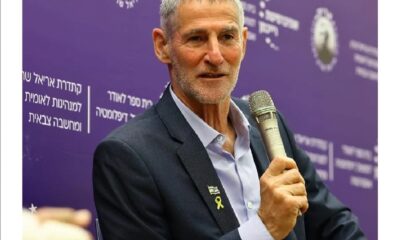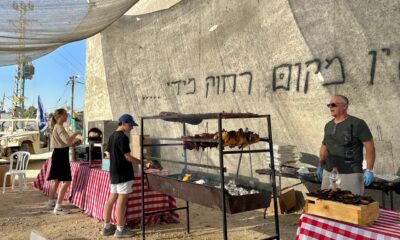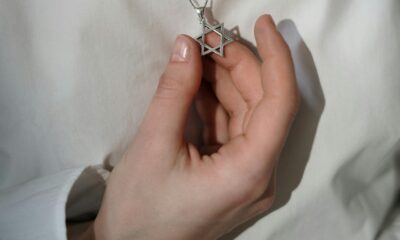
Featured Item

If I forget thee, oh Jerusalem!
Jerusalem isn’t just another city. To commemorate Yom Yerushalayim, the SA Jewish Report asked a few South African olim who have made their way to this great city about what it’s like to live there.
Solly Kaplinski
We live in French Hill, a neighbourhood of Jerusalem barely 15 minutes from the centre of downtown Jerusalem by light rail. Within easy walking distance from our apartment are Hadassah Hospital and the Hebrew University, including student residences.
The neighbourhood is a mix of religious and secular, Jew and Arab. In fact, it’s one of the most integrated and peaceful neighbourhoods in Israel and is in many ways a model of co-existence. In our apartment blocks, a number of Israeli Arabs residents are our neighbours, and at the local supermarket and sidewalk cafés, one hears a rowdy mix of Hebrew and Arabic. The university and hospital both serve as metaphorical role models for diversity and inclusion – defying stereotypes that people may have of our country.
I can’t pretend, of course, that all is hunky dory. During the intifada years in the early 2000s, a number of people were killed in buses that were blown up around French Hill, and a politician was assassinated at the nearby then Hyatt Hotel. Also, in one of the neighbourhoods “across the way” – Isawiya – sometimes some of the youngsters there get agitated and try to cause harm. Fortunately, our intelligence and police units are on the ball, and we have a strong sense of security and safety as we proceed with our daily routines.
On this Jerusalem Day, a day where we joyously celebrate the reunification of Jerusalem, I reflect on our lives in Jerusalem and in French Hill in particular, and especially the unrest over the past few weeks. On the one hand, there are extremists on the left and right who endanger the fragile stability of our lives, on the other, I’m encouraged by the vast majority of our citizens and neighbourhoods – Jew and Arab – who just want to get on peacefully with their lives, go to work, put food on the table, enjoy shopping at Mamilla Mall, and love their wives and children.
French Hill, where we have lived happily for more than 20 years, could serve as a model for the rest of our country of how people of all persuasions can get along and for the most part, live harmoniously. If emulated nationwide, this could also inspire a reunification of the different chambers of our collective hearts. Wishful thinking? Sure. But in saner moments, Jerusalem, which is our home and the place where we belong, this city of gorgeous beauty, of gold, and of dreams, also serves to inspire us to aim for the unattainable, where the impossible becomes possible!
Solly Kaplinski, a former headmaster of Herzlia High School, lives and works in Jerusalem.
Gidi Shimoni
I was born in South Africa to Litvak immigrant parents who were halutzim (pioneers) in 1920s Palestine, came to South Africa in 1929, and became naturalised citizens there. At the age of 23, I chose aliya out of ardent Zionist convictions, and Jerusalem primarily in order to study at the Hebrew University.
For 61 years, my wife, Toni, and I have made our home in Jerusalem. Our son and daughter were born and educated in Jerusalem, my parents joined us and are buried here, we love our home and life in Jerusalem, and cannot even think of living anywhere else in the world. In a prosaic sense, Jerusalem remains the preferred and treasured locus of our everyday life in retirement as it was in our working years. I suppose this is much the same as it would be any place for anyone enjoying a satisfactory life for so many years.
However, from time to time, when significant events or circumstances arouse contemplations that transcend the prosaic pace of life, I find myself caught in a vice of ambivalent feelings about life in Jerusalem. On the one hand, it’s wonderfully fascinating to live in Jerusalem. Particularly as a scholar and teacher in the field of Jewish history, I feel enormously privileged to be enveloped so tangibly, and not just symbolically, within Jerusalem’s prodigious physical, spiritual, cultural ambience harking back millennia to antiquity, yet still vital today. On the other hand, to live in Jerusalem is to be inescapably immersed in the volatile vortex of the Israeli-Palestinian conflict; a constant, if sporadic, cause of personal anxiety. It’s also to experience daily the discomfiting truth that Jerusalem, the much vaunted “eternal capital”, is far from a united city.
The internal Jewish aspect of this reality is the vast cultural divisiveness between Jerusalem’s secular and moderately religious Jewish people, and its exponentially growing haredi population. One must live within the great paradox: nothing divides Jews more than the factor of religion! Although one fully acknowledges internal haredi diversity and its democratic entitlement even to aspire to hegemony, one cannot but resent outbreaks of excessive assertiveness, oft-times extending to physical aggression by some haredi groups. I feel fortunate to reside in Beit-Hakerem, one of the few suburbs of mixed secular and traditionalist or moderately Orthodox religious Jews. Over the years, I have witnessed an unpleasant reality: not a few non-haredi Jews seeking, rather desperately, to move to Bet Hakerem, virtually escaping from suburbs with a growing majority of haredim.
But this discomfort of life in Jerusalem is nought compared to the political and social reality of Jerusalem as a city a third of whose population has patently subordinate status – mostly Arabic-speakers who self-identify nationally as Palestinians. Of course, this deplorable micro situation is inseparable from the tragic problematics of the unresolved macro Arab-Jewish conflict. And, both as a former South African and as a social-scientific historian, I emphatically reject the description of this situation as “apartheid”. Yet I cannot deny that it imposes a sense of alienation from the societal reality; a sense regretfully reminiscent of what I once felt as a white South African, which brings me to Jerusalem Day.
Nothing heightens my sense of alienation more than the triumphal ultra-nationalist, flag waving, hateful march through Jerusalem’s Old City that has come to mark Jerusalem Day. The participants in this demonstration emanate almost wholly from the redemptionist-religious-Zionist settler population and a variety of right-wing organisations and some politicians, the most prominent of whom is the proto-Kahanist MK, Ittamar Ben-Gvir.
For the love of Jerusalem, I can no longer celebrate formal Jerusalem Day.
South African born Gidi Shimoni is professor (emeritus) at the Hebrew University’s Department of Jewish History and first incumbent of the chair in Israel-diaspora relations. He is chief academic advisor for the newly opened ANU: Museum of the Jewish People in Tel Aviv. His writings include “Community and Conscience: The Jews in Apartheid South Africa” (2003).
Danny Hasson
All cities experience urban inequality. Whether you’re riding an orange rental bike on the Sea Point promenade or gazing at the Temple Mount from Armon Hanetziv, there’s no avoiding two basic urban observations. First: the poor and wealthy; ancient and modern; sacred and profane all seem to live alongside one another in a city that each side calls “home”. Second: essential municipal services and resources tend to reach some residents quicker than they do most in need.
The problem is that for many of us, we have simply grown tired of seeing the disparities, even when we look inward to our own community. As the eloquent Rabbi Feldman of Cape Town Hebrew Congregation put it on Shabbat B’Har (perhaps quoting TS Eliot), “We need to keep the familiar exciting and the exciting familiar, for the daily responsibility for tikkun [repair] is upon each and every one of us.”
Jerusalem is a large and complex city, easy to fall in love with and yet hard to love. It’s the largest Israeli city, the largest ultra-Orthodox city, and the largest Arab city all in one. For many Jerusalemites, the question of whether or not the city is – or should be – divided is a non-issue. The real question is how the diverse populations calling Jerusalem “home” can share all that this wonderful city has to offer.
In May 2018, the Israeli government passed a landmark decision (#3790) to invest NIS2.1 billion (R9.9 billion) over five years to bridge the urban infrastructure disparities that separate East and West Jerusalem in virtually all areas of life. A second five-year plan is in the works for an additional NIS4 billion (R18.8 billion) to be invested by 2028, and Mayor Moshe Leon is all systems go!
Regardless of whether you see East Jerusalem as illegally annexed under international law (in which case the Geneva Convention presides) or that Israeli sovereignty extends fully throughout the municipal boundaries of the city, as determined by the Israeli High Court of Justice, this is a tremendous undertaking. It’s an even bigger assumption of responsibility for five and a half decades of urban neglect of the East Jerusalemite Arabs and their neighbourhoods by Israeli governments. Perhaps the ultra-Orthodox communities in Jerusalem deserve a similar plan?
How can I not love my city when my local and national government are taking responsibility for tikkun in such a profound way?
The Jerusalem Intercultural Center is an independent non-government organisation dedicated to alleviating conditions of urban inequality in Jerusalem. JICC uses public participation to amplify the authentic voices of all residents (ultra-Orthodox, East Jerusalemite Arabs, secular, and modern Orthodox) to build effective leadership and cultivate trust between the municipality and the city’s strong and vibrant civil society.
Daniel Hasson was born in Zimbabwe, and went to the University of Cape Town for his undergraduate degree before making aliya with Habonim Dror in 2000. He went to Hebrew University in Jerusalem to do his MA in public policy, and is the executive director of the Jerusalem Intercultural Center.
Georgia Daniel
I never made a conscious decision to live in Jerusalem, just as I never made a conscious decision to make aliya, but I’ve been living here for more than 30 years.
Life happened, and a six-month vacation from the University of the Witwatersrand turned into a life-changing experience starting with a new university – Hebrew U. This was followed by meeting my Jerusalem-born husband, Itzik, and then spending all my adult life living in Jerusalem (or rather on the outskirts in a sleeper village called Givat Zeev) working in the pharmaceutical industry and raising three children.
What do I love about the city? I love the postcard version of the city – the one that millions of tourists flock to every year. I love walking in the Old City, making a conscious effort to get lost and always discovering something new. I love the breathtaking view I see every time I drive over Mount Shmuel and see the city spread over the Jerusalem hills. I love the central areas of Jerusalem – Mamilla, Mahane Yehuda market, Yemin Moshe, the German Colony, and the surrounding areas.
You feel like you’re on vacation spending time there along with tourists from four corners of the world. I love the silence that descends on the city just before Shabbat starts, and then hearing the siren go off to let you know that Shabbat is about to start. Of course, the best part of living in Jerusalem is the snow that blankets the city most winters.
On the other hand, Jerusalem is a living, breathing city like any other in the world, where you visit your doctor, get your car fixed, or your passport issued.
The dark side of Jerusalem is the underlying tension caused by the Israel-Palestinian conflict, which is constantly bubbling in the background, with sporadic outbreaks of violence to jar the usual harmony of the residents of Jerusalem – Jewish and Arab.
Besides the political tension, I can safely say the worst part of Jerusalem is the traffic, which gets more problematic with each passing year, even though every effort is being made to upgrade the public-transport system.
Jerusalem is many things. It’s a melting pot of religion, people, culture, clashing politics, ancient history, as well as a city preparing for the future with hi-tech parks and constant building (I recommend visiting the new Jerusalem underground railway station!)
Where would I live if not in Jerusalem – somewhere with a beach and good weather!
Johannesburg-born Georgia Daniel (nee Klein) went to Israel in 1988, and has since made it her home. She works in the pharmaceutical industry.
Dinah Poyurs
Jerusalem is famous for many reasons, from being the capital city of Israel to the home of the holy sites of the three primary religions. Jerusalem is filled to the brim with joy and tragedy, war and peace, ancient and modern. It’s truly an honour to live in such a unique and diverse city.
Over the past four years, I’ve been lucky enough to live all over Jerusalem and especially in the Old City. I love the diversity of Jerusalem, not only the people but also in areas and architecture.
There are wonderful islands of greenery in the otherwise traffic-congested city. Jerusalem is filled with rich history, walking down a new street can unfold into an entire history lesson.
There are certainly aspects that make it a challenging place to live, especially in times of political tension. Over the past few years, I have lived through a Jerusalem that has gone through much turbulence. It’s a complicated place that’s often the heart of conflict, tension, and sacrifice.
However, I feel exceptionally privileged to go to Hebrew University, where I learn with a wide range of people and who have deepened my appreciation of how special Jerusalem is.
The first time I came to Israel was on MTA in a Bnei Akiva gap-year programme. Throughout that year, no matter where we travelled, Jerusalem felt like home. The longer I live in Jerusalem, the more connected I become to the vibrant culture and holiness of the city. But moving to a new city, let alone a new country, is always a challenge, and Jerusalem is no exception.
From learning bus routes to building a community of friends, there have been many challenges on the journey to feeling like a true Jerusalemite. Living in Jerusalem feels like a continuous adventure, you never know when a familiar face will turn up or if your bus will show up on time (they are relatively reliable).
It’s constantly changing, and if you’re not up for the odd uphill marathon, Jerusalem might not be the place for you.
People often ask where I would want to live if I wasn’t living in Jerusalem, and I always struggle to come up with a satisfactory answer. Jerusalem encapsulates so many of my favourite aspects of life in Israel. So, for now, I’m hoping to stay put and enjoy every moment that I have the privilege to live here.
Dinah Poyurs graduated from Yeshiva College in Johannesburg before going to Midreshet Harova (MTA 2018). She made aliya in 2019 and did two years of Sherut Leumi (National Service) and is now living in Jerusalem as a Hebrew University Mechinah Programme student.










